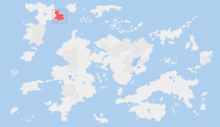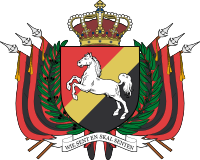Nation/Soltsteed
| This page is a work in progress by its author(s) and should not be considered final. |
| Soltsteedish Commonwealth Soltsteedisch Gemeinweud
|
||||||
|---|---|---|---|---|---|---|
|
||||||
| Motto: Wie sent en skal senten (Soltsteedish: "We are and shall be") |
||||||
| Anthem: Triomphesmarsch (Soltsteedish: "March of Triumph") |
||||||
Location of Soltsteed in Esportiva
|
||||||
| Region | Esportiva | |||||
| Capital | St Christopher | |||||
| Largest city | Port Michael | |||||
| Official languages | ||||||
| Languages of historical significance |
||||||
| Demonym | Soltsteedish Soltsteeder |
|||||
| Government | Unitary parliamentary constitutional monarchy | |||||
| - | King | William Thomas | ||||
| - | Prime Minister | Jan-Mikäel Johanssen | ||||
| - | Speaker of the National Council | Sophie Mickelssen | ||||
| - | Speaker of the National Diet | Alexandre van de Graaf | ||||
| Legislature | Senate | |||||
| - | Upper house | National Council | ||||
| - | Lower house | National Diet | ||||
| Currency | Shilling (HAS) |
|||||
| Time zone | SST | |||||
| DST not observed | ||||||
| Date format | dd-mm-yyyy | |||||
| Drives on the | left | |||||
| Internet TLD | .ha | |||||
Soltsteed (/sɔːltˈstiːd/; locally /sɒlʔˈstiːʔ/; Soltsteedish pronunciation: /sʌlʔsteːt/), officially the Soltsteedish Commonwealth, is a unitary parliamentary constitutional monarchy located on the eastern end of the Esportivan continent of Andarica.
Etymology
The name Soltsteed derives from Old Saxon: Solt is a dialectal form of the Saxon salt (which is reflected as saut in modern Standard Soltsteedish) and is cognate with the English word "salt"; the element steed derives from stedi, meaning "city" or "place". The name references the salt mines that were the source of Soltsteed’s historic wealth and fame.
Most Germanic languages use calques such as Dutch Zoutstad German Salzstadt and archaic English Saltstead, while Romance languages tend to use names derived from Salia, such as French Selie. Greek uses the similarly-derived name Aleia (Άλεια), from whose ancient form Haleia comes Soltsteed’s two-letter country code.
History
Geography
Geology
Climate
Biodiversity
Politics
Soltsteed is organised as a democratic, parliamentary constitutional monarchy with universal suffrage. The Soltsteedish political system operates within the bounds of and derives its legitimacy from the 1947 Constitution, which regulates the powers of state institutions and the relationship between the state and the people; it is founded on the principles of responsible government, judicial independence and the rule of law and guarantees fundamental and universal human rights that cannot be infringed upon by the state.
Law and judiciary
Administrative divisions
Soltsteed is divided into 30 administrative counties (landen), which are grouped into three historic provinces: Walland in the north, Saxland in the south-east and Sealand in the south-west. The counties are in turn divided into ridings (tredinge), which are themselves divided into municipalities (gemeinden).
Ridings are governed by a directly elected riding council (tredingsraat) and have powers over housing, social service administration, planning applications, public transportation, utilities, leisure, recreation and waste collection. Counties are similarly governed by a county council (landesraat) and are responsible for roads management, waste disposal, policing, fire services, vehicle licensing, civil registries, transport planning, health services, tourism and water and flood defence. On the other hand, provinces and communes exist largely as points of geographic reference, and retain only limited administrative significance.
Saxland
|
Sealand
|
Walland
|
Military
Economy
Transport
Energy
Science and technology
Tourism
Demographics
Ethnic groups
Urbanisation
Language
Education
Healthcare
Religion
Culture
Architecture
Literature
Art
Music
Theatre
Film
Cuisine
Sport
Holidays
| |||||||||||||||||||||||||||||||||||||||||||||||||||||||




